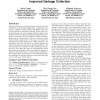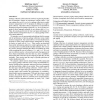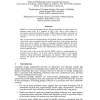319 search results - page 10 / 64 » Age-Based Garbage Collection |
113
Voted
SIGMETRICS
2004
ACM
15 years 7 months ago
2004
ACM
This paper explores and quantifies garbage collection behavior for three whole heap collectors and generational counterparts: copying semi-space, mark-sweep, and reference counti...
139
click to vote
IWMM
2007
Springer
15 years 8 months ago
2007
Springer
Past studies have shown that objects are created and then die in phases. Thus, one way to sustain good garbage collection efficiency is to have a large enough heap to allow many ...
113
click to vote
GECCO
2006
Springer
15 years 6 months ago
2006
Springer
Garbage collection can be a performance bottleneck in large distributed, multi-threaded applications. Applications may produce millions of objects during their lifetimes and may i...
116
click to vote
OOPSLA
2005
Springer
15 years 8 months ago
2005
Springer
Garbage collection yields numerous software engineering benefits, but its quantitative impact on performance remains elusive. One can compare the cost of conservative garbage col...
130
click to vote
POS
1998
Springer
15 years 6 months ago
1998
Springer
PMOS is an incremental garbage collector designed specifically to reclaim space in a persistent object store. It is complete in that it will, after a finite number of invocations,...



